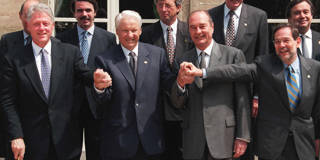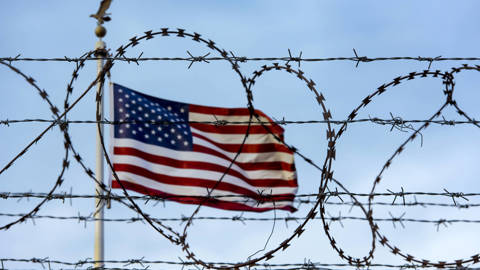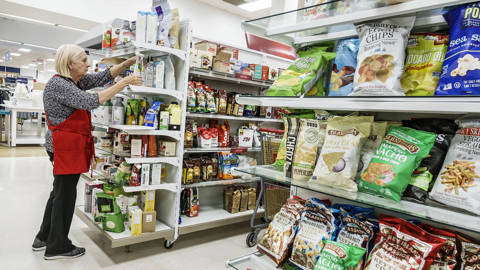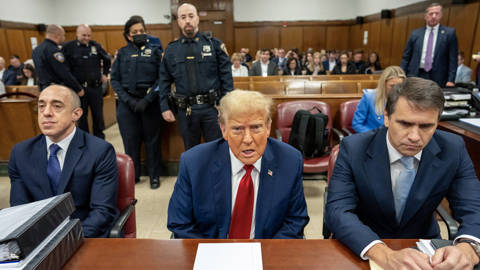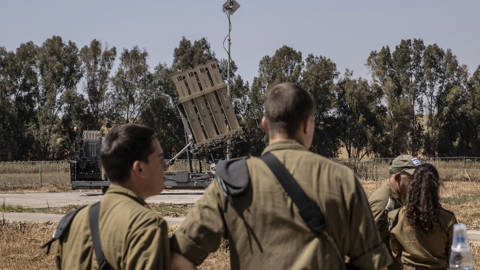The World Order After the Ukraine War
While Russia's invasion of Ukraine in February came as a shock to much of the world, in a sense, it was a continuation of a war that began in 2014. Finding a sustainable solution to the crisis will require an understanding of this history as much as an aptitude for diplomacy.
Nina L. Khrushcheva: First, there was the world-changing COVID-19 pandemic. Then, on February 24, 2022, Russian President Vladimir Putin launched his “special military operation” in Ukraine, and the world changed even more. This new reality demands a new set of rules that not only reflects the current state of affairs, but also recognizes how we got here.
I’m Nina Khrushcheva, Professor of International Affairs at the New School in New York. Today, I’m honored to discuss this topic with Javier Solana, President of EsadeGeo – Center for Global Economy and Geopolitics. Solana was NATO’s secretary-general in the 1990s, a time when the Alliance was undergoing major changes following the Soviet Union’s collapse and the Cold War’s end. He subsequently served as Secretary-General of the Council of the European Union and EU High Representative for the Common Foreign and Security Policy.
Javier, you helped to write the rulebook for the post-Cold War world, including both the military and foreign-policy chapters. Has Russia’s war on Ukraine changed that rulebook forever, or can some elements of it still be salvaged?
Javier Solana: When I was NATO Secretary-General, I – like many others – believed that we in the West needed to devise a solid, coherent policy toward Russia, which was then led by its first president, Boris Yeltsin. So, in January 1997, we launched negotiations aimed at securing Russia’s agreement on the opening of NATO to more countries.
In those negotiations, Russia was represented by then-Foreign Minister Yevgeny Primakov, for whom I had great respect. It was a tough negotiation, as you can imagine. But it was also successful: we agreed on the Founding Act on Mutual Relations, Cooperation, and Security between NATO and the Russian Federation, and we created a NATO-Russia council. At the same time, Russia accepted the initial opening of NATO, a process that began at the NATO summit in Madrid less than two months later, with three countries – Poland, Hungary, and the Czech Republic – starting their journeys toward NATO accession.
I would like to note that the Founding Act was signed by Yeltsin and me. It was an agreement between Russia and NATO. I viewed it as a major success.
NK: So, you are saying that in the late 1990s, Russians agreed to NATO expansion. But a narrative has gained traction in recent years – especially in the last year – that Yeltsin was duped, that he didn’t quite understand the agreement’s implications. According to some sources, US President Bill Clinton told Yeltsin, “Well, the expansion is not going to be in your lifetime, so you shouldn’t really worry.” So, Yeltsin kind of agreed, but he didn’t mean to agree. And, of course, there was the promise made after German reunification in 1990 that NATO would not expand – a promise that Russians talk about incessantly today.
I was the last research assistant of the great American diplomat George F. Kennan, who wrote the 1947 “X” article, “The Sources of Soviet Conduct,” which defined US policy toward the Soviet Union. In 1997 and 1998, Kennan was writing letters to then-US Deputy Secretary of State Strobe Talbott saying, “Do not expand NATO. Even if Russians swallow it now, because they have no choice, it will ultimately influence Russia’s politics and behavior.” Some would say that Kennan’s predictions have come true. In your understanding, is there some selective memory at play with regard to the first post-Cold War cycle of NATO expansion?
JS: Nina, what I can tell you is what I lived. I cannot lie about that. That agreement was signed. I did not get any sense that the Russians did not want to make it. I do think that the subsequent rounds of NATO enlargement were not carried out with the same care, the same person-to-person negotiation, as the first.
I also think that Putin’s perspective changed considerably after the terrorist attacks of September 11, 2001, which transformed US foreign policy. Suddenly, the fight against Osama bin Laden was all that mattered to the United States. As a result, America’s relationship with Russia suffered, and Putin probably got the sense that he was not that important to the US anymore. China’s accession to the World Trade Organization – also in 2001 – probably did not help matters, as it gave China a tremendous economic push at precisely the moment when Putin felt that his position on the world stage was somehow diminished.
NK: I agree with you that Putin did not feel he was important enough to the US. But I slightly disagree about what drove that feeling. Remember when Putin called US President George W. Bush to express his sympathy over 9/11? And it was in that same year that Bush declared that he had looked Putin in the eye and gotten “a sense of his soul.”
Putin may have believed that the understanding and sympathy he had shown – highlighting, for example, Russia’s struggles with Islamic fundamentalism in Chechnya – merited more appreciation or attention from the US. Despite this soulful connection he had supposedly had with Bush, Putin was not, in his view, being treated as equal partner. And I think that began to change his perspective.
JS: Nina, I agree with you. At the end of the day, Putin expected to be a global leader, and around the turn of the century, he was probably unhappy with his sense that Russia was not considered a major power.

Subscribe to PS Digital
Access every new PS commentary, our entire On Point suite of subscriber-exclusive content – including Longer Reads, Insider Interviews, Big Picture/Big Question, and Say More – and the full PS archive.
NK: Absolutely. Remember Putin’s speech at the 2007 Munich Security Conference, in which he called for a new security architecture in which Russia would be a major player. In fact, he made clear in that speech his view that NATO expansion represents a “serious provocation” that reduces “mutual trust.” And when he felt that his words were being misconstrued or disregarded, he resorted to threats.
JS: Let us bring Ukraine into the discussion. In 2004, the country held a presidential election. There were two candidates: the Putin-backed prime minister, Viktor Yanukovych, and opposition leader Viktor Yushchenko. Yanukovych won in a run-off, but the vote was widely believed to have been rigged. This triggered the so-called Orange Revolution, with protesters calling for a new election.
Along with then-Polish President Aleksander Kwaśniewski, I engaged in talks with Russia’s ambassador to Ukraine, Viktor Chernomyrdin, and even with the president of the Russian Duma, to convince them to agree to the protesters’ demand. A new election was ultimately held – and Yushchenko won. It was the first time Putin’s candidate in Ukraine lost, and I believe this upset him considerably. How do you see it?
NK: I agree. I think that was the first time Putin got the sense that Ukraine was slipping from his grasp. This may have been one of the many steps that led us to the invasion.
Javier, you mentioned earlier the 1997 NATO Summit in Madrid. NATO recently held another summit in the same city, but in a very different world. In a Project Syndicate commentary, you laid out the decisions that needed to be made at the summit, and highlighted the fact that, somewhat ironically, the war in Ukraine has spurred a new NATO expansion, with Finland and Sweden applying to join. How do you assess the outcomes of the summit?
JS: As an observer, I think that the Madrid summit was a great success, not least because NATO officially invited Finland and Sweden to join. Indeed, this represents a major mistake on Putin’s part: with his war on Ukraine, he convinced two European countries, which are geographically just as close to Russia as Ukraine, to abandon neutrality and join NATO.
NK: The Chinese and Russian press reject the notion that NATO is a defensive alliance, arguing that it is obviously an offensive vehicle whose purpose is to support American hegemony. And a growing NATO footprint, such as in the Asia-Pacific, could advance the division of the world into adversarial blocs, especially considering the strategic challenge China poses. What do you think of such claims?
JS: With regard to China, the West must be clear in offering to continue talking and cooperating, in order to prevent precisely the outcome you mention. In fact, avoiding such a global decoupling is the single greatest challenge the world faces today. A shift to “two globalizations” – one organized around the US, and the other around China – would have dire consequences, because neither side could address global challenges such as climate change without the other.
NK: You haven’t been in European politics for over ten years, but you are remembered as a great diplomat. I recently met with somebody close to the Kremlin, who brought you up. As they put it, there is a crisis of human resources in European diplomacy today. We need “more Dr. Solanas,” capable of the kind of diplomacy you exercised with Chernomyrdin and Primakov, to tackle the challenges we face, including the prospect of a global decoupling. In any case, your perspective on global affairs is extremely valuable.
I would like to return to Putin. When he says that, by disregarding Russia’s security concerns, the West left him with little choice but to act, does he have a point?
JS: Nina, when Putin first became president in 2000, he appeared to be somebody with whom one could deal. But by 2004, his situation had become more complicated, not least because of his concern that Ukraine was slipping away.
In 2013-14, the European Union and Ukraine negotiated an Association Agreement. Yes, it was an important step for Ukraine. But it was nothing monumental; it certainly was not going to solve all of the country’s problems. Nonetheless, it infuriated Putin. That is where the war started.
Yanukovych, by then the president, refused to sign, owing to pressure from Russia. Ukrainians mounted the largest protests since the Orange Revolution. Yanukovych fled the country. And Putin annexed Crimea – a move to which the West may not have responded sufficiently clearly and rapidly.
NK: Yes, I think this was a mistake. The West should have imposed total sanctions – like those in place today – in 2014, because the Russian security state – the KGB state – was much weaker at the time.
When it comes to Putin’s actions, there is an interesting distinction between tactics and strategy. Putin fears the loss of his sphere of influence, whether through the EU’s 2014 Association Agreement with Ukraine or the expansion of NATO. And his reactions to those fears have brought some tactical victories: beyond annexing Crimea, he has managed to secure control of parts of Ukraine’s eastern Donbas region. But strategically, his actions are – and will be – an absolute disaster for Russia.
What are the roles of other organizations – especially the United Nations – in providing guidance and leadership in global affairs?
JS: Sadly, I think the UN has not played a role in the Ukraine conflict at all. To be sure, given that multiple permanent members of the UN Security Council have a stake in the conflict, it would be very difficult for the UN to do much. But it should be doing something nonetheless, even if it does not ultimately make much difference. At the very least, the UN should show the world that it tries.
NK: Since Russia’s invasion of Ukraine, there has been much speculation about China’s plans for Taiwan, with some suggesting that the resolute Western response to Russia’s war could deter Chinese President Xi Jinping from invading the island. Is Xi set to invade Taiwan?
JS: I think that we have enough problems to deal with. We should concentrate on resolving the conflict in Ukraine and addressing its spillover effects, including food shortages in Africa and elsewhere. For now, there is no conflict in Taiwan, so the question can wait.
NK: This is an excellent answer. I always shudder when people start lumping the Ukraine war in with other current and future global problems, as if we are looking for another war while we are still dealing with this one. And I agree that the solution to the current crisis will ultimately lie in negotiations.
